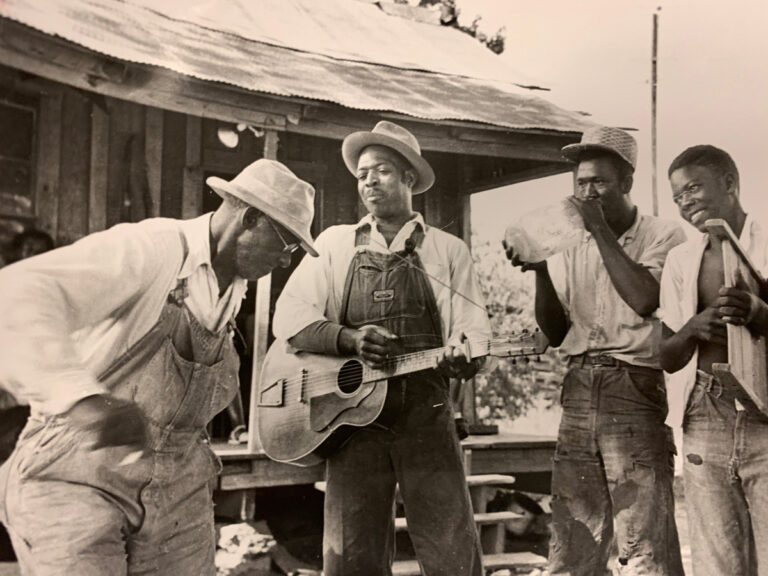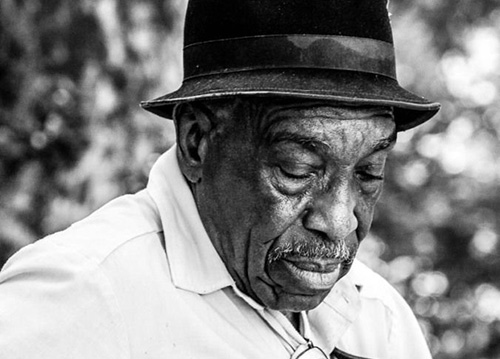ALABAMA BLACKBELT BLUES

Image by Fred Ramsey
Alabama Black Belt Blues is the first film in a new series, Alabama StoryMakers, from Alabama Public Television.
Alabama’s blues tradition, centered in its fertile Black Belt, is more rural than the well-known Mississippi Delta blues and in some sense closer to the original source. What is known as the blues developed out of the slave culture of the 19th century and lives on today in the impoverished yet culturally rich Alabama Black Belt. The work of John and Alan Lomax along with Pickens County native Ruby Pickens Tartt during the 1930s and 40s brought Alabama’s Black Belt blues music to the fore with their recordings of Vera Hall, Dock Reed, Rich Amerson and a host of other singers, some previously unknown. As the film will demonstrate, Alabama’s Black Blues tradition is still strong today.
Alabama Black Belt Blues uses slave narratives, archival blues recordings and the recorded music of contemporary African American blues musicians to explore the role this music has played in the region from slavery onward. From cotton fields, to church pews, to prison spaces, to juke joints rural and urban, the film follows the refrain of the region’s blues through the cultural landscapes of Alabama, yesterday and today.
PRODUCER/DIRECTOR
 Robert (Bob) Clem, is an Alabama native, graduate of Birmingham-Southern College, and graduate of New York University’s graduate film school. His most recent feature film, How They Got Over: Gospel Quartets and the Road to Rock ‘n Roll has won multiple awards and appeared in 26 film festivals in Europe, Asia, Africa, Australia and the U.S. and screened at both the Grammy Museum in Los Angelos and the County Music Hall of Fame. Big Jim Folsom: The Two Faces of Populism (1997); William March/Company K (2004); John Patterson: In the Wake of the Assassins (2007); Eugene Walter: Last of the Bohemians (2008); Malbis Plantation: Greece to America (2009); The Jefferson County Sound (2012); The Passion of Miss Augusta (2016); and The Two Worlds of William March (2017). A sample of his work as an ethnographic cinematographer in West Africa can be seen in Mali in Five Minutes (2010).
Robert (Bob) Clem, is an Alabama native, graduate of Birmingham-Southern College, and graduate of New York University’s graduate film school. His most recent feature film, How They Got Over: Gospel Quartets and the Road to Rock ‘n Roll has won multiple awards and appeared in 26 film festivals in Europe, Asia, Africa, Australia and the U.S. and screened at both the Grammy Museum in Los Angelos and the County Music Hall of Fame. Big Jim Folsom: The Two Faces of Populism (1997); William March/Company K (2004); John Patterson: In the Wake of the Assassins (2007); Eugene Walter: Last of the Bohemians (2008); Malbis Plantation: Greece to America (2009); The Jefferson County Sound (2012); The Passion of Miss Augusta (2016); and The Two Worlds of William March (2017). A sample of his work as an ethnographic cinematographer in West Africa can be seen in Mali in Five Minutes (2010).
Press Information and Photos
For press information and photos, please visit the aptv.org pressroom.
BLUES LEGENDS OF THE ALABAMA BLACK BELT

“BIRMINGHAM” GEORGE CONNER (1934-2016)
The late “Birmingham” George Conner (1934-2016), born in Aliceville, is one of the fathers of the Chicago Blues. The author of songs performed by famous “blues” artists, such as Howlin’ Wolf, B. B. King and others, he was late Willie King’s guitar teacher. In the early 1950s, Conner left Aliceville for Chicago to achieve his dream of becoming a “blues” musician. It was there that “Windy City” musicians christened him “Birmingham” George, a nickname that followed him during his musical career. According to Conner, “nobody knew where Aliceville was, and when people asked me where I came from, I would say Birmingham, the most known city in Alabama. This is how I became Birmingham George.” Alabama Black Belt Blues features, among others, Conner’s music and footage of his pioneer of country blues performances as well as an interview with his daughter.

VERA HALL, BLUES SINGER (1902 – 1964)
Adele “Vera” Ward Hall is considered by many music fans to be the foremost singer of the “blues” and African American spirituals to come out of Depression-era Alabama. Vera Hall, as she is popularly known, recorded, with the help of Alabama folklorist Ruby Pickens Tartt, a large body of work for ethnomusicologists working for the Library of Congress.
Hall was born in Payneville, a small community, just outside of Livingston in Sumter County, Alabama. Sumter County folklorist, Tartt, introduced Hall to folklorist and ethnomusicologist John Avery Lomax during his 1937 travels in the Southeast gathering music from the fields, churches and community gatherings. Lomax collected these oral histories, song recordings and images of Alabama’s Black Belt for the Works Progress Administration (WPA) and the Library of Congress’ Archive of American Folk-Song.
Hearing the recordings made by Lomax and Tartt, others traveled to Sumter County to do their own recordings, and Hall became one of the most sought-after singers. In the 1940s, she gained an international audience when the British Broadcasting Corporation played her recording of “Another Man Done Gone” as an example of folk music in the United States. Later, the recording was played during a commemoration ceremony of the Emancipation Proclamation at the Library of Congress. In 1948, Hall traveled with Alan Lomax, John’s son, to New York where she performed at the American Music Festival at Columbia University. After 1959, little is known of her life other than she continued to work as a laundress and cook.
Vera Hall died and was buried in the Livingston Cemetery near Morning Star Baptist Church. Her grave site was lost sometime during the 1970s after the wooden cross marking the site was bulldozed. In 2005, Vera Hall was inducted in the Alabama Women’s Hall of Fame and the Alabama Black Belt Halls of Fame.
Tartt scholar Tina Naremore Jones notes in the Encyclopedia of Alabama that Vera Hall’s “examples of early blues and versions of folk songs appear than can be found nowhere else. (Her) voice and her renditions of traditional songs are a defining part of Southern Black culture and the Alabama Black Belt region.” Hall’s music is widely available and continues to influence contemporary artists, such as Moby, and attract new audiences.
Dr. Tina Naremore Jones
Professor of English
Center for the Study of the Black Belt
University of West Alabama, Livingston
ZEBEDIAH “DOC” REED (1898-1979)
Zebediah “Doc” or “Dock” Reed and Ruby Pickens Tartt’s working relationship and friendship spanned more than 40 years. Reed was the cousin of Vera Hall and the two often sang spirituals together. Reed’s baritone voice boasts a distinctive sound; his duets with Hall often evoke that of a congregation “feeling the music” together. A deeply spiritual man, Reed declined to perform any songs he considered “sinful,” “wicked“ or “worl’l.” Tartt first heard him sing at Pilgrim’s Church, an event that is recorded in Carl Carmer’s Stars Fell on Alabama.
During John Lomax’s first recording trip to Sumter County, Alabama, the WPA folklorist and ethnomusicologist recorded Hall and Reed singing “Mourin’ Song,” “Oh, Jesus, Jes’ Write My Name,” and “Let Me Ride” together. In Lomax’s 1947 autobiography, Adventures of a Ballad Hunter, he wrote of Reed, “…his speaking and singing voice –deep, vibrant, resonant, tremulous at times–always tore at my heartstrings, brought chilly sensations along my spine.”
Lomax’s admiration of Reed never failed, nor did he ever fail to inquire of the deeply spiritual man in his letters to Tartt, nor visit him when in Livingston. Following Lomax’s death, Tartt reported she and Reed wept and sang spirituals together. Reed, in turn, as a soloist and during the reading of the prayers, would do the same at Tartt’s funeral in 1974. For Reed, spirituals comforted and celebrated both the singer and the listener.
While Reed made his living as a farmer in Alabama’s rural Black Belt, he also was known locally as a talented split-oak chair and basket maker. Today, Doc Reed’s songs and his baskets continued to be shared and passed down from one generation to another among families in Livingston.
Dr. Tina Naremore Jones
Professor of English
Center for the Study of the Black Belt
University of West Alabama, Livingston
FEATURED ARTISTS
CLARENCE “BLUESMAN” DAVIS
Clarence Davis is an Alabama-based blues singer and guitarist. He was born and raised in Eutaw on what he describes as a plantation, before moving to Cleveland, Ohio in his late teens for three years. He later moved back to Alabama in 1979 at the age of 22. Clarence has been a regular feature at the late Willie King’s Freedom Creek Festival over the years. He is also one of the founders of the long established Black Folk Roots Festival held in Eutaw, an event in which he regularly plays. He often performs at the Howlin’ Wolf Festival at West Point, Mississippi. Davis has opened shows for the likes of Grammy-award winning blues musician Bobby Rush and Birmingham native, Rock & Roll Hall of Fame honoree Sam Lay.
SAM FRAZIER, JR
Sam Frazier, Jr., was born in the mining town of Edgewater, Alabama, near Birmingham. His mother would hold backyard barbecues where the liquor would flow, and musicians often would come and play. Among them were Sonny Boy Williamson and Slim Harpo, who both gave Frazier harmonicas and encouraged him to play. Inducted into the Alabama Blues Hall of Fame, Frazier is the rare bluesman who plays the harmonica and sings both blues and country music, including his country hit “Cabbage Man.”
WILLIE KING
Willie King was an internationally famous blues musician from Alabama’s Black Belt who died in 2009. He began the Freedom Creek Blues Festival, which for several years was held on his West Memphis property in Pickens County. King is seen as one of the most influential rural blues musicians whose music often had a political message. Alabama Black Belt Blues will incorporate footage of King courtesy of Saskia Reitmeijer and Bart Drolenga—Dutch
“LITTLE LEE” & BAND
Hanable L. Gee, known as “Little Lee” makes his home in Montgomery. He and his band are among the most entertaining, lively acts on the Alabama “blues” circuit, playing in clubs in Montgomery and Birmingham, among others. A “blues” guitarist and vocalist, he is backed by keyboard, bass and drums in the Black Belt country “blues” style. For many years, Lee was a fixture of the Chicago “blues” scene. In Alabama Black Belt Blues, he recounts his experiences there. The film features “Little Lee” and his band performing at Archibald’s juke joint in Bolligee.
CLEO “BIG BO” McGee
Cleo “Big Bo” McGee (1928-2002) was a blues performer, songwriter, and harmonica player. McGee was born on on the border between Emelle, Sumter County, and Porterville, Mississippi. Growing up straddling the state line, McGee later joked that his family could eat breakfast in Alabama and go to sleep in Mississippi. He toured Europe in the 1990s as part of the duo Little Whitt and Big Bo and together they recorded the CD Moody Swamp Blues. He later achieved acclaim for his work visiting schools and educating students about the blues.
B.J. REED
Brenda Corder Reed grew up in Pickens County. Her father was a prominent leader, farmer and civil rights organizer, as well as a preacher. The family home, today abandoned, took in civil rights workers during the turmoil of the 1960s, and B.J. has many stories about Black Belt life during those times. Reed painfully shy was terrified of performing on stage. She found the courage as a teenager and began a career that has taken her all over the nation as a blues, gospel and jazz singer. Reed is currently the educational director with the Alabama Blues Project (Tuscaloosa).
CANDY MARTIN SHINES
Candy Martin Shines, born in Alabama’s Black Belt, moved to Tuscaloosa before starting school. There her mother, abandoned by her husband, opened a juke joint, Going Down To Big Mary’s House, to support the family. Shines began her singing and dancing career at Big Mary’s House, later joining a local band where her career as a singer really began. Performing with a variety of groups in Alabama and the South, she met and later married the Alabama “blues” star Johnny Shines. Since her husband’s death (1992), she has continued to sing and keep the blues alive.
NIGEL SPEIGHTS
Speights, a young blues phenomenon, is a senior at Greene County High School. He learned to play guitar at age 8 with the help of Aaron Hodge, once a member of Willie King’s band. A former member of the Alabama Blues Project Advanced Band, Speights has played at the annual Roots Festival in Eutaw—as well as numerous other festivals—the legendary Gip’s (juke joint) in Birmingham, and churches around Eutaw.
JOCK WEBB
Jock Webb, born in Rosedale, was well-known as an area for musicians looking for resting places while traveling. Growing up there, Webb listened to a wide range of musicians, such as Cleve Eaton, John Lee Hooker, William King of the Commodores, and Sonny Boy Williams. This exposure planted a seed that would blossom during his 20s when he got his first harmonica. Webb’s style is reminiscent of the traditions of the blues, the juke joints and the down-home style of the Alabama Black Belt. He is a veteran of the U.S. Coast Guard and today works on a rural cooperative in Pickens County.
EARL “GUITAR” WILLIAMS
Earl “Guitar” Williams was born in Bessemer, Alabama and took an interest in the guitar at an early age, encouraged by Black Belt native Henry “Gip” Gipson, a longtime fan of the blues who lived in Bessemer. Williams’ first guitar was made from a cigar box. Later he became a regular performer at Gip’s Juke Joint, an improvised building in Mr. Gip’s backyard. Williams has traveled worldwide with B.B. King and many other renowned blues musicians and is a member of the Alabama Blues Hall of Fame.
SUPPORTERS
Alabama Black Belt Blues is made possible through the generous contributions of the Alabama Humanities Foundation, Alabama State Council on the Arts, Alabama Tourism Department, The Chapman Foundation, The Daniel Foundation, and the Paul & Alma Fischer Education Endowment
.












Follow Us